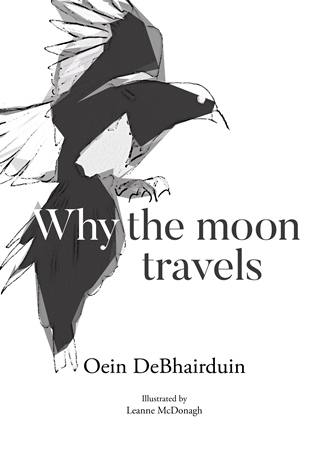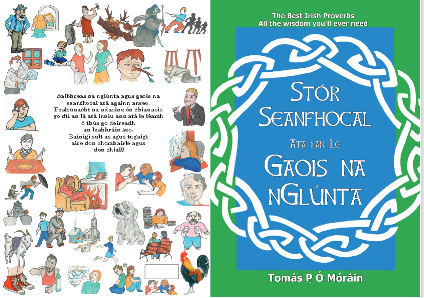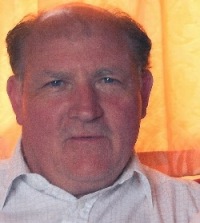Why the Moon Travels is a beautifully turned out hardback which has between its covers twenty Travellers tales (literally.) It was written by Oein DeBhairduin.
Oein is an Irish Traveller. He is also a trained folk
herbalist, syndicated astrologer and metal worker. As head of a
Traveller community based education centre, he has for long time been a
collector of elder tales and community customs. A practitioner of
indigenous healing and celebratory practices are also under his belt.
He is, of course, a philosopher. And why wouldn’t he? Didn’t his
mother tell him that there were three things that no man understands, “ .
. . the sharp edges of a broken heart, the mind of a woman and the
value of the dandelion.”
Oein is from Galway, and has been living in Dublin for
number of years. As a community employment supervisor with the
Clondalkin Travellers Training he set many young Travellers on the
road to a higher level of education, training and personal empowerment.
His own educational background was in developmental
psychology and as a trained herbalist he set up an online herbal store
called “The Irish Apothecary”. In which he sold urban harvested
resins, oils and blends. Alongside this he also runs an online blog
called “Barefoot Pavee” (which was shortlisted in last year’s Irish Blog
Awards) in which he actively promotes traditional skills,
craftsmanship, recipes, lore and many of the interesting and beautiful
aspects of Traveller’s language and community.
Why the Moon Travels came as no surprise to readers of his
columns in national magazines and regional newspapers . As a core
member of the LGBT Pavee Support Group, he works to, “. . . cultivate
safe places in which LGBT individuals can chat openly, seek and give
peer based advice, influence policy development through identification
of needs and provide a platform in which this aspect of our community
can express their views publicly.”
Passionately proud of his own cultural background, he says “
I feel that pride should never be just a word or a statement but an act
of will and manifestation that produces a positive and discernible
presence within our lives.”

|
In the introduction Oein says, “Gammon . . .is used freely and
openly in the stories as this collection is not only for reading, but
for sharing out loud, an act that not only helps keep the stories alive
but but also respect the ancient oral traditions of travellers.” Or
somebody like me who spent decades learning bits and pieces of Gammon
from members of the Travelling community the glossary of Gammon words is
a welcome bonus. The title story was told to Oein by his father and
his reason for including it in the collection is, “ . . . that
Travellers are part of the world and the world is part of travellers.”
He goes on to say, “Among other thing, this story reminds me of the
fragility of trust and the innate desire to love in all people.” When
you read the story you will see exactly what he means.
Leanne McDonagh, a Traveller, with an Honours degree in fine
art and and a higher diploma in art and design education, who
illustrated the book says,”I’ve alway seen Oein as a fellow artist,
always knew he had an amazing way with words,”
Grainne O’Toole who, with Fionnuala Cloke, established Shein
Press wrote, “I had known of Oein’s work and his interest in education
and cultural development through my own background in community and
human rights. I also became aware of his beautiful writing, and we
reached out to him and asked if he would be interested in working on the
collection.” That invitation has resulted in a masterpiece.

|
Stor Seanfhocal
Seanfhocal is the Irish word for proverb. In Ireland we are
very proud of those simple, concrete, traditional saying that express a
perceived truth based on common sense or experience. Everyone from
Confucius the John B. Keane who uttered words of wisdom, is quoted by
the populace. Now Ballaghaderreen man Tomás P. Moráin has now brought
out a collection of the most common proverbs that he has collected over
the years. He has written down each proverb in Irish, explained it in
simple Irish and then goes on to elaborate its meaning in English.
Every one of the 82 entries is accompanied by an appropriate
illustration buy Marita O’ Hanlon.
We all know that there are proverbs that don’t hold water,”
Ask me no questions and I’ll tell you no lies” and many more that don’t
stand up to scrutiny but fair play to the Balaghaderreen man he doesn’t
use any of those in his collection.
Details from; morantommy@hotmail.com
* * * * *
They say that 70 is the new 50. Maybe it is but try telling that
to a speed-camera. In the meantime have a read of this which was
published 182 years ago. "Periods of Human Life," from the Wexford
Conservative, 1 August 1838.
Decrepitude – From 71 to 77: The age of avarice, jealousy, and envy.
Caducity- (Senility) From 78 to 84. The age of distrust, vain-boasting, unfeelingness, suspicion.
Age of Favour – From 81 to 91. The age of insensibility, love of flattery, of attention and indulgence.
Age of Wonder- From 92 to 98. The age of indifference and love of praise.
Phenomenon – From 99 to 105. The age of insensibility, hope and the last sigh."
* * * * *
My local town Blessington, four miles from Lacken, has been
shortlisted as one of two finalists (the other one is Kinsale) in the
Population 3 Category (4001-7000) in the Bank of Ireland Begin Together
Awards. Final judging is now under way and the overall awards will be
announced on October 06th.

|
Everybody in Lacken and the surrounding wishes them well and we hope they win.
See you in November.






No comments:
Post a Comment